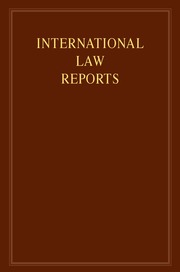No CrossRef data available.
Article contents
The Volga (Russian Federation v. Australia)
Published online by Cambridge University Press: 01 January 2021
Abstract
International tribunals — International Tribunal for the Law of the Sea — Applicable law — United Nations Convention on the Law of the Sea, 1982 (“UNCLOS”) — Relationship between International Tribunal and domestic courts and administration — Decision of the International Tribunal under Article 292
Sea — Exclusive economic zone (“EEZ”) — Arrest of vessel — UNCLOS Articles 73 and 292 — Procedure for ensuring prompt release of vessels and crew — International concern over illegal fishing in the Southern Oceans — Patagonian toothfish — Conservation of Antarctic Marine Living Resources — Coastal State jurisdiction — Exercise of sovereign rights of coastal State — Volga flying flag of Russian Federation — Illegal fishing in EEZ of Australian Territory of Heard and McDonald Islands — Arrest of Volga outside EEZ — Seizure of vessel, equipment and fish
Treaties — Interpretation and application — Object and purpose of treaty — Context of provision — UNCLOS — Article 73(2) — Meaning of the expression “reasonable bond or other financial security” — Examination by the International Tribunal of level and elements of the bond set by Australia — Whether circumstances of seizure of vessel relevant to assessment of bond — Whether a “good behaviour bond” requiring use of vessel monitoring system (“VMS”) reasonable — Whether additional non-financial conditions of bond reasonable — Assessment of gravity of alleged offences — Whether international concern over illegal fishing relevant to assessment of gravity and to level of bond
Keywords
- Type
- Case Report
- Information
- Copyright
- © Cambridge University Press 2005




